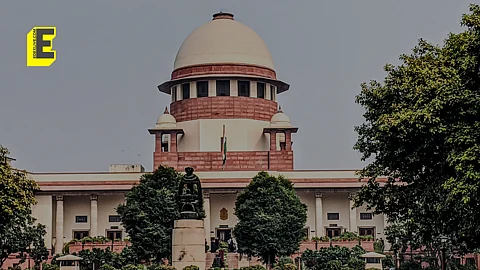
- News
- Campus
- Exam
- Podcast
- Web Stories
- Do You Know
- Path Finders - UG Programs
- Videos
- Book Review

A review petition has been filed in the Supreme Court (SC) of India challenging its recent judgment mandating three years of legal practice as a minimum eligibility requirement for entry-level judicial posts, specifically for Civil Judge (Junior Division).
As per a report by LiveLaw, the petition, filed by advocate Chandra Sen Yadav through Advocate-on-Record Kunal Yadav, argues that the May 20 judgment delivered by a bench of Chief Justice of India (CJI) BR Gavai, Justice AG Masih, and Justice K Vinod Chandran in the All India Judges Association case contains errors apparent on the face of the record, and warrants a review.
While challenging the basis of the ruling, the petitioner also urged the apex court to implement the three-year practice condition only from 2027 onwards. This, the petition says, would prevent unjust exclusion of law graduates from the batches of 2023 to 2025, who had prepared for judicial services exams under the previous eligibility criteria.
“Immediate enforcement causes retrospective hardship, violating principles of fairness, legitimate expectation, and equal opportunity under Article 14 of the Indian Constitution,” the petition states.
The review petition argues that the Supreme Court failed to consider the Shetty Commission’s recommendations, which had earlier suggested removal of the practice requirement on the grounds that law curricula already include court visits and internships, and that judicial training is imparted post-selection.
The petitioner also contends that the judgment was based solely on affidavits submitted by certain high courts and state governments supporting the rule, while contrary views from others, including the States of Nagaland, Tripura, the High Court of Punjab and Haryana, and Chhattisgarh, were not adequately considered.
“Judgment lacks empirical basis”
The petition criticises the judgment for lacking factual backing, stating that the Supreme Court did not cite any data, statistics, or studies to show that fresh law graduates perform poorly as judges. It points out that many such graduates have historically performed well after undergoing standard training procedures.
“There was no comprehensive data placed before this Hon’ble Court to establish that fresh law graduates or candidates without three years of Bar experience are underperforming in judicial roles,” the petition submitted.
The petitioner described the court's reliance on the general views of amicus curiae and high court counsel as arbitrary, arguing that the decision was not supported by any objective evaluation of judicial performance, added LiveLaw.
Impact on marginalised and non-litigation professionals
The petition further highlights that the rule disproportionately affects aspirants from marginalised backgrounds, who may not have the means to pursue three years of litigation practice.
Additionally, it points out that the rule excludes law graduates working in law firms, public sector undertakings (PSUs), and corporate legal departments, despite their relevant legal expertise.
The petitioner also raised constitutional concerns, stating that the blanket imposition of the eligibility rule across all states and high courts through a judicial order, without legislative backing or stakeholder consultation, amounts to the court overstepping its constitutional role under Article 141.
